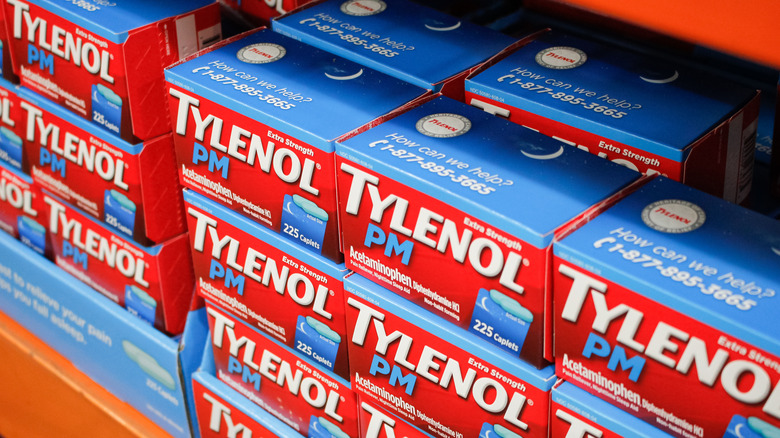Is It Safe To Take Tylenol PM Every Night?
If you suffer with insomnia, you're not alone. One article released from the University of Pennsylvania School of Medicine, concluded that 1 in 4 Americans develop a sleep disorder (termed acute insomnia) every year, via Science Daily. As a result, many are turning to over-the-counter medications, like Tylenol PM, to help mitigate those sleepless nights. Tylenol PM markets itself as a nighttime pain reliever and sleep aid that works fast and helps promote a solid night's sleep. But what's actually in it and how does it work?
Tylenol PM contains both acetaminophen and diphenhydramine. Acetaminophen is the generic name for Tylenol and is a mild pain reliever used to treat minor body aches and fever. What makes Tylenol PM a marketable sleep aid is the addition of diphenhydramine. Diphenhydramine is an antihistamine that can cause drowsiness, via Consumer Reports. While neither of these ingredients have yielded clinical evidence of being addictive, health experts warn there may be other serious health concerns and psychological dependencies as a result of daily use.
Potential drawbacks of Tylenol PM
Diphenhydramine is classified as an anticholinergic drug that effectively promotes sleep by blocking acetylcholine, a brain chemical that plays a strong role in muscle activation. However, that chemical is also responsible for important cognitive functions like learning and memory, via Time. Thus, healthcare professionals are increasingly concerned about the negative effect of using anticholinergic drugs, like diphenhydramine, and a potential risk of cognitive decline over longterm use. A 2015 cohort study found a cumulative, negative effect of using anticholinergic drugs over the course of 10 years, significantly increasing the risk of dementia, via JAMA Internal Medicine.
And what about dependency? Additional research needs to be conducted regarding the exact nature of dependency for sleep aids like Tylenol PM. But health experts emphasize that a lack of supporting evidence of habit-formation doesn't mean it doesn't exist. It simply requires further investigation. What we do know is while Tylenol PM is labeled as non-habit-forming, this claim is generally within the context of those who use the label's recommended dose for no more than two weeks, via Consumer Reports. Many consumers, however, rely on the medication daily for years. This may also point to the concern of psychological dependencies. Some consumers think they can't get a good night's sleep without the medication and thus begin relying it. Medical professionals urge those who have difficulty sleeping for more than two weeks to enlist the help of healthcare professionals. By identifying the root cause, consumers can focus on long-term, healthy solutions instead.


